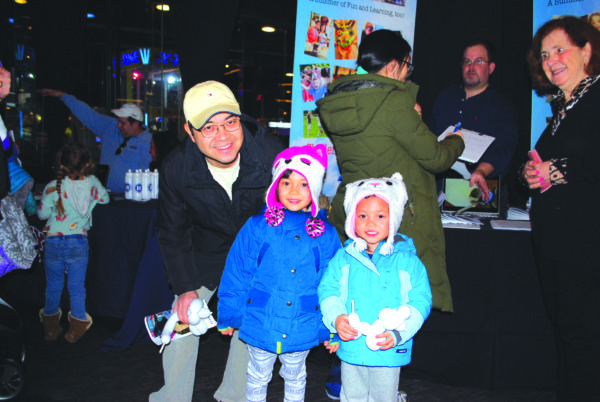Despite the low temperatures, many parents’ minds are on the summer months that lay beyond the snow. Much consideration goes into the camp selection process. As the American Camp Association notes, “camp presents a tremendous opportunity for your child to widen horizons, make new and lasting friends, and discover new strengths.” But, with all the options ranging from day camps to sleep away camps in addition to specialties such as dance, art and sports, pinpointing the right one can be downright daunting.

PHOTO BY ROBERT FLEISHER
Local camp fairs feature an array of highly curated prospects that parents can become acquainted with in just one afternoon. Since many attend these events with a laundry list of questions and children in tow, arriving with a strategy is instrumental to reaping the benefits.
Why A Camp Fair?
There is a plethora of information about each camp online and in glossy brochures, but camp fairs give parents the unique occasion to meet the individuals who set the tone of a camp in person. Tables are typically manned by two representatives including the camp director or high ranking camp personnel. “Many camps offer similar activities and amenities, but it is the director and staff who infuse their distinct philosophy into the program that sets them apart,” according to Renee Flax, director of camper placement at the American Camp Association of NY and NJ. “These face-to-face opportunities give families the chance to see if there is a true connection between them and a camp,” she says.
Jean Sheff, editor and co-publisher of Westchester Family, says, “This is your chance to read between the lines and get to know a camp’s nuances.” Sheff knows more than a thing or two about the topic as the publication recently hosted two “Westchester Family Camp Fairs” in both southern and northern Westchester. She enthusiastically describes the events as “not massive, noisy functions, but intimate, personal gatherings of approximately 30 thoroughly vetted camps.”
“Camp fairs are ideal for those who are truly starting from scratch,” according to Flax. “These events offer a wide array of camps spanning all philosophies and price ranges.” For all of those multi-tasking loving parents, Sheff also points out that camp fairs offer efficiencies, for example “visiting with a sleep away camp for one child and a day camp for another.”
Not all camp fairs, however, are created equally. Flax recommends looking at the list of camps that will be exhibiting and advises “if the programs do not stand out to you, don’t waste your time!” An added benefit of these events is that they are often attended by impartial experts in the camp arena such as representatives from the American Camp Association or the organization hosting the event. Therefore, it’s important to identify who the organizer is and whether they are legitimate and responsive. Sheff counsels, “Camp fairs should be free to the public as the camps pay to attend. Any fair charging an admission fee is a red flag!”
Set yourself up for success. Attend a camp fair on a convenient day that’s close to home, particularly if you are visiting with day camps as they tend to promote at local events. Consider whether it makes sense to bring your children as some may be bored or present as distractions, while others enjoy the fun activities exhibitors offer. For older children especially, it presents a chance to be involved in the decision making process and get them excited for what the summer has in store. “The beauty of a camp fair,” Renee explains, “is that it can be eye-opening to see what excites your child. Their enthusiasm can be instrumental in guiding your final selection.”
Mission Possible
“Investing a little bit of time to narrow your options in advance can be so helpful,” Flax points out, saying, “Identify factors important to your family. Don’t simply think of your children as they exist today, but look at camps that could work for them in the long-term.” Sheff adds to that, “Know what you are looking for, know your family, know your child. There are camps for everyone.” She advises against, “becoming dazzled by a camp’s vast offerings if they are not right for your child.”
Visit the camp fair website in advance and familiarize yourself with the exhibitors if the information is available. Assess your family’s needs and narrow down the options by identifying some of these differentiating factors:
- ages the camp serves
- day camp vs. overnight camp
- availability/location of busing
- session camps vs. full summer camps
- availability of early hours/aftercare
- food offerings, i.e., allergies
- indoor vs. outdoor focused programming
- special needs services
Seek a map of the event space upon your arrival to locate the camps you found appealing. Flax warns against roaming aimlessly and highly recommends arriving with time to spare before the event closes. Additionally, be patient if the camp representatives are engaged for a short time upon your arrival.
What Matters Most
Prepare your questions in advance and bring a notebook. “It’s not about the right number of questions, but more importantly, the specific issues that are your family’s top priorities,” says Sheff. Curate your questions using the sample list below. Good questions will result in a strong sense of the camp’s culture and enable you to learn which simply do not work for your family.
1. Does a camp provide your child with your definition of safety, i.e., lifeguards, supervision, during field trips, etc.?
2. What does the camp strive to achieve, i.e., what’s considered a successful summer?
3. What activities does the camp focus on, i.e., frequency of swimming program, etc.
4. How is staff selected and trained?
5. What is the counselor-to-camper ratio and is it higher for younger campers?
6. What is the staff retention rate?
7. How are disciplinary problems handled?
8. How do you deal with child specific issues including homesickness, bedwetting, food allergies?
9. Do you offer busing and if so, who provides the service, where does it pick your child up and who is monitoring the children?
10. What do the children do on rainy days?
For overnight camps, how is bunk placement determined and how do they incorporate new children into existing bunks?
Follow-Up
While undeniably informative, camp fairs can result in information overload. Review your notes, taking into account the intrinsic connection you may have had with camp personnel. Following this exercise, one to three camps should emerge. Contact those camps to schedule off-season tours and use that opportunity to meet with the director and ask any questions you didn’t ask during the fair. Flax recommends requesting references from parents who have children in the same group that your child would be placed in to get an insider’s perspective on the camp experience.
Once you make your selection, feel confident that you have truly done your research and prepare your children for a wonderful experience. Flax provides peace of mind, asserting, “People who do their homework thoroughly and make a decision based on their family’s needs don’t tend to make mistakes.”
VISIT OUR CAMP SPONSORS!
Breezemont Day Camp
BreezemontDayCamp.com
914-367-1936
Club Fit Summer Camp
www.ClubFit.com
914-250-2768
Future Stars Summer Camp
FScamps.com
914-273-8500
Harvey Cavalier Camp
HarveyCavalierCamp.org
914-232-0581
Jodi’s Gym Camp
www.JodisGym.com
914-244-8811
World Cup Camp
WorldCupNurserySchool.com
914-238-9267
WorldCupGymnastics.com
914-238-4967

